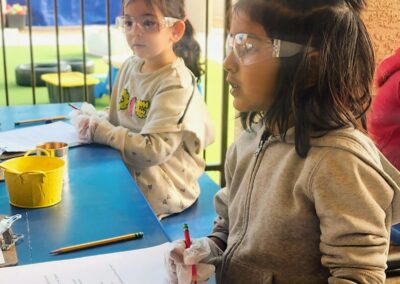KINDERGARTEN READINESS
Important Info for ParentsWhat is Kindergarten Readiness?
Kindergarten Readiness refers to a child’s academic, social and emotional development. These factors are all important indicators of a child’s potenetial success in our program.
How Will I Know if my Child is Ready for Kindergarten?
In the state of Arizona, any child who turns 5 years old before September 1st of the school year for which they will be attending, is eligible for kindergarten. AFM follows the same September 1st deadline for entry into our kindergarten program.
My Child Turns 5 After September 1st. What Are My Options?
Not sure if your child is eligible for AFM’s kindergarten program based on their DOB? We’ve got you covered. After completing the pre enrollment process, you can schedule a Kindergarten Readiness Assessment and our administrator will determine if your child meets the academic and social/emotional benchmarks required for this program. Our Kindergarten Readiness Assessment focuses on language and literacy development, number recognition, basic operations, direction following skills, and task management. Additionally, the administrator will observe the child’s social skills with peers, their physical control, and the child’s overall self-regulation abilities. If the administrator determines that the child meets the academic and social/emotional critirea, they will be offered early entry in AFM’s kindergarten program.
Pros of Sending Your Child to Kindergarten Early
1. Academic Readiness
- If your child is already reading, writing, or showing advanced cognitive skills, kindergarten may provide more appropriate academic stimulation.
2. Social Motivation
- Some younger children thrive when surrounded by older peers—they may rise to the challenge and enjoy the structure and routine of a classroom setting.
3. Long-Term Acceleration
- Early starters may benefit from being challenged academically earlier, potentially leading to advanced coursework or early graduation later.
4. Parental or Logistical Needs
- Sometimes families need full-day kindergarten for work or life balance, and early enrollment can support that need.
Cons of Sending Your Child to Kindergarten Early
1. Emotional/Social Readiness
- Even if academically capable, younger children may struggle with focus, frustration tolerance, or peer conflict—areas that are developmentally tied to age.
2. Physical Maturity
- Younger children may feel smaller, slower, or less coordinated compared to older classmates, which can impact confidence (especially in sports or active play).
3. Long-Term Social Impact
- Being the youngest in the class can affect friendships, leadership opportunities, and even confidence into middle/high school.
4. Pressure to Perform
- Advanced learners who start early may feel pressure to “keep up” or stay ahead—this can lead to stress or burnout over time.
5. Ineligibility Without Testing
- In most districts, children who turn 5 after Sept 1 must pass early entrance testing or meet strict criteria—which can be stressful and isn’t guaranteed.
Questions to Consider:
- Is my child more advanced in one area (e.g., reading) but still developing in others (e.g., emotional regulation)?
- Can they sit, listen, and follow multi-step directions for extended periods?
- How do they handle frustration, peer conflict, and group learning?
- Am I pushing for early kindergarten because of logistics, or because my child truly needs it?
Final Thought:
There’s no one-size-fits-all answer. A child who seems “ready” in one moment might benefit from another year of growth and leadership in a preschool setting. On the other hand, an emotionally mature, academically eager child might truly thrive by starting early—if the school and family can support the transition.




